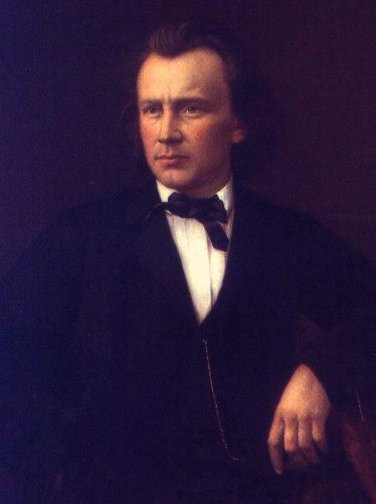Seraphic Fire’s fleet Brahms Requiem sacrifices something in expressive depth

Johannes Brahms
For two weeks, a group of aspiring singers drilled with the professionals of the Miami choir Seraphic Fire at a choral boot camp of sorts at the University of South Florida in Tampa.
Their work culminated in performances of the Brahms’ German Requiem, presented Saturday in Tampa and Sunday at All Saints Episcopal Church in Fort Lauderdale.
The 50 singers at the front of the church clearly had a different tone than the dozen or so who usually perform for Seraphic Fire. Textures were fuller, less distinct and softer around the edges, without the almost piercing clarity that Seraphic Fire brings to performances. But this may have been more in keeping with the intentions of the composer, who wrote the work in the golden age of amateur choruses and who used 200 singers at the work’s 1868 world premiere at Bremen Cathedral.
And despite the larger forces, the chorus performed with surprising agility, as in the middle section of Denn alles Fleisch es ist wie Gras, and in strongly marked fugal passages. Sopranos sang with particular warmth and brilliance in the work’s closing passages.
Artistic director Patrick Dupré Quigley took brisk tempos throughout. This brought an exciting momentum to Denn wir haben hie keine bleibende Statt, in which the text says the dead shall rise in the twinkling of an eye, at the last trumpet, with a powerful crescendo in the chorus, and in the third section’s long fugal passage over a pedal point in the piano.
But his tempos also cost the work something in breathing room and seriousness of tone, as in Selig sind die Toten, or Blessed are the Dead, where his fast-paced approach seemed hurried.
They performed a chamber version of the work, an arrangement by Brahms that replaces the orchestra with a four-hand piano accompaniment. Taking on the thankless task of serving as a pale imitation of an orchestra were pianists Justin Blackwell and Scott Jarrett, who handled their parts with intelligence and sensitivity, playing with enough power to support the chorus but without making the piano shake by attempting to achieve orchestral grandeur.
Paul Tipton sang the baritone solos with a darkly lustrous voice, bringing an urgency to the passages of death and resurrection. The soprano Teresa Wakim brought a radiant voice to Ihr habt nun Traurigkeit, words of comfort for mourners.
The collaboration Sunday was done under the auspices of the Professional Choral Institute, a collaboration between Seraphic Fire and the University of South Florida, where Seraphic Fire singer and chorusmaster James K. Bass is director of choral studies. The combined choral forces have recorded the British version of the German Requiem performed Sunday, and the CD is expected to be released in August.
After the German Requiem, the members of Seraphic Fire performed Frank Ticheli’s There Will be Rest, a short work of slowly changing, gently dissonant harmonies that profited from the absolute clarity and even tone produced by the choir.
Posted in Performances, Uncategorized
One Response to “Seraphic Fire’s fleet Brahms Requiem sacrifices something in expressive depth”
Leave a Comment
Mon Jun 6, 2011
at 10:31 am
1 Comment







Posted Jun 06, 2011 at 3:08 pm by Ceci LaDuca
I was in the new Concert Hall for the first time for this performance and it certainly took my breath away.